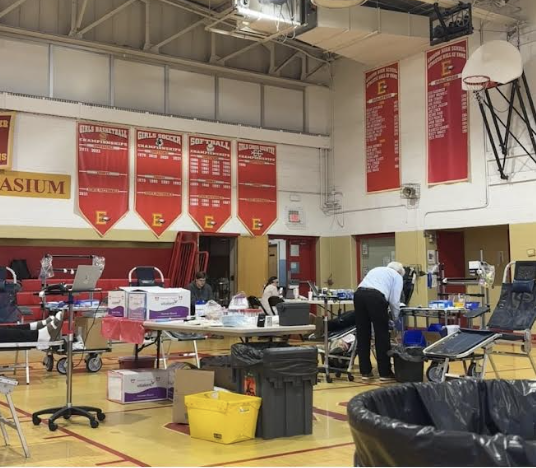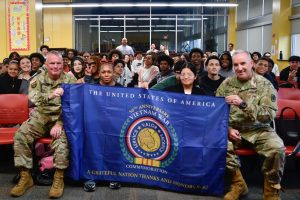“What’s Next? Plans After High School”
February 8, 2021
As the endless college tabs of essays, spreadsheets, and Common App come to a close, so does our high school experience. However, unlike any other year, the Class of 2021’s transition to this new journey ahead remains daunting with the COVID-19 pandemic continuing to ravage the human lives around us daily. Even with companies like Moderna and Pfizer continuing their efforts to distribute the vaccines worldwide, the Class of 2021 faces an uncertain and unprecedented beginning to their post-high school journey.
From seniors’ overall experiences with virtual education, some seniors wonder if they will receive an adequate education and foundation in order to pursue their aspirations in college. “I am worried about the lack of a quality education,” said Ayush Jasnani ’21. For college students, face-to-face interactions among students, professors, and faculty at colleges serve as the foundation for a quality education both inside and outside the classroom. If the COVID-19 pandemic maintains the status quo of virtual learning, seniors may certainly question if tens of thousands of dollars of college tuition is really worth it. “Online courses might mean I don’t get my money’s worth,” says Colleen Tonra ’21.
For seniors planning to commute or travel abroad for college, the process of acclimating to the college environment while creating new connections with fellow students will also prove challenging under the COVID-19 conditions. For majors involving hands-on activities, such as engineering and biology, the process of adaptation will prove especially difficult under the current circumstances. “I may not be able to perform labs,” said Rishab Gera ’21. Without lab and experiment experience, aspiring science and engineering majors may struggle to develop the foundational skills to succeed in their intended career. In addition, for students traveling abroad for their college education, acclimating to a new dorming experience will prove challenging in the effort to reduce infection rates. Seniors, Vincent Nguyen ’21 and Saketh Sitaram ’21, believe that student connections in the college environment and dorms will prove difficult as they transition into college.
As college decisions arrive in the coming months, the COVID-19 pandemic prevents students from college visits to understand the “vibe” of the college. “There will be a big difference between virtual and in person tours of schools,” said Jainesh Desai ’21. Under normal circumstances, seniors would have the opportunity to travel to different campuses, determining the qualities and environment that will best suit their needs and interests. However, the COVID-19 pandemic has rendered students to virtual tours of the campus with no raw interaction between college and high school students. Even as colleges open their campuses to bring students to the campus, many high school students struggle to travel to these campuses as the COVID-19 pandemic reaches an all-time high. Given these alarming statistics, seniors will lose the opportunity to discover each college’s unique qualities, hindering them from truly making an informed decision on their higher education plans.
With the prospect of college being so uncertain, students have ventured into looking towards alternatives to the traditional college route. Discussions of taking a gap year, entering trade school, or joining the military instead of attending college right after high school have increased considering the possibility that colleges will operate under virtual learning. Because of the high price of college tuition and growing concerns about the job market, students must reconsider what path would work best for them. Although American society pressures high schoolers into attending a four-year institution, this option may work for everyone. As Adeola Ajboro ‘21 stated, “I’m not paying $30k just to sit at home.” Therefore, to adapt to these unprecedented times, students are forced to march into unchartered territory with little guidance or support as they search for a new direction in their life.
During this COVID-19 era, taking a gap year seems like the ideal option for those still trying to navigate their future. Not only does it provide extra time to make a decision, save up money, and explore life outside of academia, but also offers flexibility to account for the ever-changing circumstances. Life exists beyond the endless amounts of assignments and assessments. Perhaps this pandemic will be the catalyst for students to pursue something new without feeling the need to conform to society’s standards. Because of the pandemic, Jackelyn Carrillo-Torres ‘21 plans to take a gap year to focus on work instead of enduring a virtual college school year. “We all are dealing with so many things and the fact that school is the worst out of them all says something about the system,” she said.
These issues in the higher education system have disillusioned many students. The pandemic exposed colleges’ greediness and unpreparedness as these institutions continue to charge exuberant amounts of money for a few lackluster three-hour Zoom calls. This situation poses the question for graduating high school seniors: is college really worth it?
This question prompts students to reconsider their educational journey. For some, they may be more encouraged to try community college and then transfer to another school in order to save money. Unfortunately, some students look down upon their peers for going to community college for the first two years but in the end, they still earn a college degree and end up in less debt. The education system needs to destigmatize going to community college. Money saved can be spent towards the next institution or even graduate school. Yet, college is not the answer for everyone.
Despite the narrative that going to college is necessary, COVID-19 offers the opportunity to experiment with different paths to pursue after high school. Even though Alfred Bispo ‘21 plans on studying pre-law in college, he plans to keep his options open by thinking about joining the air force or try becoming an electric technician. Keeping these possibilities in mind ensures that students can adjust their life plans depending on whatever this pandemic throws their way. As a result, there should be no judgement or shame associated with taking an unconventional route. After all, at the ripe age of 17 or 18, students are still continuing to figure out their plans, goals, and aspirations for the future.
However, no matter how troubling times get, the Class of 2021 will prevail. The heart-ache that we have suffered through has enabled us to prepare for even the darkest days that lie ahead. This class will enter the world with undying resilience. Whether we end up going to college, taking a gap year, attending trade school, or joining the military, we will make up for this lost time and build our futures.























































































